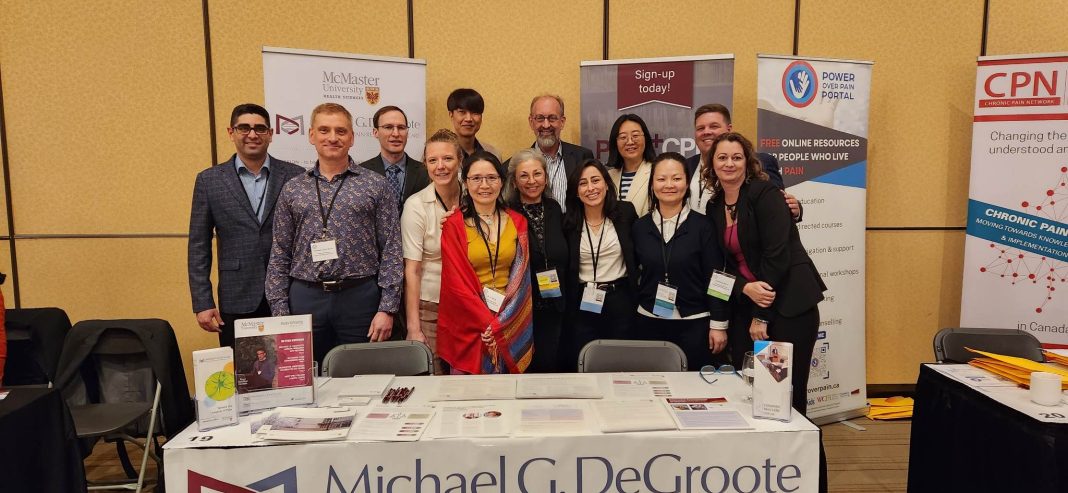The Pain PLUS literature surveillance service demonstrates the importance of high-quality literature to support decision-making and practice for the use of opioids
McMaster University has had a significant leadership role in advancing the practice of evidence-based health care. Part of this leadership has been through the creation of programs and services that support individual clinicians and others in their striving to stay up to date in the rapidly expanding volume of healthcare knowledge and to separate high-quality materials from the large quantity of published work in order to make best use of their, often limited, time for review of publications.
We are pleased to describe a substantial effort in Knowledge Mobilization/Knowledge Translation [KM-KT] that focuses on the field of pain literature.
As a result, it has great relevance to the topic of safer and more effective use of opioids. The initiative addresses the need for pain clinicians and others to ensure that they are in possession of up-to-date, high-quality information. The service accomplishes this by surveying, indexing, appraising and disseminating the most rigorous published pain clinical trials derived from more than 120 journals.
In addition to making material available to professionals, this service also provides Lay Summaries of selected topics amongst the articles indexed, thus promoting public awareness of the field. We encourage you to subscribe to the free service using the link provided. Painpluscpn.ca
Addressing the Canadian opioid crisis
In our series for Open Access Government on the safer and more effective use of opioids, we have focused on many aspects of the opioid crisis in Canada, including clinical and policy matters relevant to the topic. A recurring theme has been the need for the dissemination of research results and the gaps that exist in our overall knowledge about pain.
The Knowledge Mobilization initiative described here aims to provide the best possible service to clinicians, educators, trainees, policymakers, and the public regarding the current state of knowledge in the field of pain care. This is obviously relevant to understanding how opioid use is best integrated into the practice of pain care. The initiative is referred to as ‘Pain+ CPN.’ It is part of a program called ‘Mac PLUS’, or ‘Premium LiteratUre Service’, developed at the Health Information Research Unit [HIRU] at McMaster University in the late 20th- early 21st century.
The MacPLUS service
The MacPLUS service was developed to address the problem faced by clinicians in staying abreast of the growing number of publications available while having limited time to personally survey the literature. MacPLUS supports knowledge translation for clinical practitioners. It identifies material that has been screened by expert methodologists to ensure that clinical trial reports demonstrate a high degree of methodological rigor. Once methodological rigor is established, publications are further reviewed by subject matter experts for their newsworthiness and relevance.
Within the Health Knowledge Refinery, the McMaster PLUS database consists of a curated collection of those references from the medical literature that are critically appraised by experts and practicing clinicians to have high-quality, high clinical relevance and newsworthiness.
The PAIN+CPN Collaboration
In 2012, HIRU leader Brian Haynes, members of the Rehabilitation Science faculty (Joy MacDermid and Mary Laws), and the Anesthesiology Department (Norm Buckley) collaborated to expand the PLUS service to include surveillance of pain-related literature. Initially, the number of journals was limited by the available resources, but in 2016, PainPLUS was enhanced with funding from the Chronic Pain Network.
This national pain research network is one of six chronic disease networks funded by the Strategy for Patient- Oriented Research [SPOR] program within the Canadian Institutes of Health Research [CIHR]. CPN is a national network led by McMaster and the Michael G DeGroote Institute for Pain Research and Care.
As part of the CPN KT strategy, CPN funding permitted broadening the literature surveillance to over 120 journals for pain-related clinical trials.
The current features of PAIN+CPN include ratings of each eligible article for clinical relevance and newsworthiness by at least three practitioners for each discipline for which the article might be pertinent and e-mail alerts about new evidence.
Each alert includes MORE clinical ratings and comments, electronic links to the article’s abstract via PubMed (if available) and full-text article via PubMed or the publisher’s site (if available for free); a cumulative searchable database of articles that is continuously updated (from mid-2007 forward); a search interface to access relevant information in the accumulating database; evidence-based search strategies for MEDLINE to supplement searches in the cumulated PLUS database when needed; download options for citation management; and links to evidence-based resources.
The Pain+CPN service also includes lay summaries directed at providing the public with plain language descriptions of the work being indexed. Currently, there are 74 of these available in both English and French, and they are called ‘Evidence Summaries’. These are part of the enhanced service supported by CPN, and we target providing at least one new summary each month. The French language versions are accessed by selecting the En Francais button associated with an individual Evidence Summary.
An essential solution
Effective Knowledge Translation/ Mobilization is essential for all aspects of medicine, and in challenging fields such as pain care and opioid use, the need is greater than ever.
We recommend pursuing services such as Pain+CPN and suggest that you take the link here to review the service, register, and perhaps even engage by signing on as a rater!
Dr Buckley and Dr Busse thank Dr Lori-Ann Linkins, the Knowledge Translation Platform lead for HIRU, and Rachel Roy, the Knowledge Broker for CPN, for reviewing this article.

This work is licensed under Creative Commons Attribution-NonCommercial-NoDerivatives 4.0 International.


